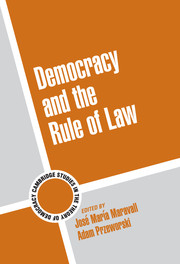Book contents
- Frontmatter
- Contents
- List of Contributors
- Acknowledgments
- Introduction
- Part I
- 1 Lineages of the Rule of Law
- 2 Power, Rules, and Compliance
- 3 Obedience and Obligation in the Rechtsstaat
- 4 A Postscript to “Political Foundations of Democracy and the Rule of Law”
- 5 Why Do Political Parties Obey Results of Elections?
- Part II
- Part III
- Author Index
- Subject Index
5 - Why Do Political Parties Obey Results of Elections?
Published online by Cambridge University Press: 09 November 2009
- Frontmatter
- Contents
- List of Contributors
- Acknowledgments
- Introduction
- Part I
- 1 Lineages of the Rule of Law
- 2 Power, Rules, and Compliance
- 3 Obedience and Obligation in the Rechtsstaat
- 4 A Postscript to “Political Foundations of Democracy and the Rule of Law”
- 5 Why Do Political Parties Obey Results of Elections?
- Part II
- Part III
- Author Index
- Subject Index
Summary
If democracy is to exist, at least one rule must be observed, namely the rule that specifies which of the political parties should occupy the office of government. My purpose is to investigate under what conditions political parties competing in elections obey their results.
According to one view, people obey laws when they share a particular kind of culture. This culture may value the rule of law per se, regardless of the outcomes it generates. It may impose on people the duty to obey outcomes resulting from rules to which they agreed. Or it may foster temperamental characteristics predisposing them to obey laws. But whatever the specific features, rule of law can be sustained if and only if a society is characterized by a particular culture.
An alternative theory sees the emergence of a rule of laws as an outcome of conflicts of interests. While situations in which everyone acts according to law can be described in cultural terms, this theory claims that such situations arise when the conflicting political forces find it in their best interest to act in conformity with some laws, given what everyone else is doing.
The controversy concerns the causal mechanisms that generate these situations: are they an expression of some antecedent cultural patterns or are they an effect of pursuit of interests? Both views arrive at the same conclusion – namely, that there are some situations in which political actors act in conformity with laws.
- Type
- Chapter
- Information
- Democracy and the Rule of Law , pp. 114 - 144Publisher: Cambridge University PressPrint publication year: 2003
- 12
- Cited by



